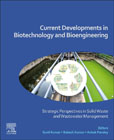
Current Developments in Biotechnology and Bioengineering: Strategic Perspectives in Solid Waste and Waste Water Management
Kumar, P.B. Sunil
Kumar, Rakesh
Pandey, Ashok
Current Developments in Biotechnology and Bioengineering: Strategic Perspectives in Solid Waste and Waste Water Management explores conventional and advanced biotechnologies for waste management, including socio-economic aspects, techno-economic feasibility, models and modeling tools, and a detailed LCA approach in SW and WW. These innovative technologies are highly applicable to current real world situations. The enormous increase in the quantum and diversity of SW and WW-including waste materials generated by human activity and their potentially harmful effects on the environment and public health-have led to increasing awareness about an urgent need to adopt novel technologies for appropriate management of both SW and WW. While there is an obvious need to minimize the generation of wastes and to reuse and recycle them, the technologies for managing such wastes can play a vital role in mitigating problems. Besides recovery of substantial energy, these technologies can lead to a considerable reduction in the overall waste quantities requiring final disposal, which can be better managed for safe disposal in a controlled manner while meeting pollution control standards. Outlines appropriate technologies for SW and WW management systems and their applications Presents and evaluates the Best Available Technologies (BAT) and includes global case studies Provides methods for evaluating the way to use appropriate technological systems to develop the best technically and economically feasible projects worldwide Offers an excellent resource for university students to use for their research, dissertations, etc. INDICE: 1. Introduction2. Traditional Solid Waste Treatment Technologies3. Conventional Waste Water Treatment Technologies4. New Generation Technologies for Solid Waste Management5. Advanced Waste Water Treatment Technologies6. Design Principles in Water Reclamation for Better Water Quality (Retention, Blending, Multiple barrier concept, Strategies for reliability into system operation, HACCP Framework and Application to potable, Australian Potable reuse Guidelines)7. Recovery of Value-added Materials from Solid Waste8. Recovery of Value-added Materials from Waste Water9. Landfill Mining of Dumped Solid Waste for Land Reclamation10. Challenges and Opportunities Associated with Solid Waste (Technical constraints, Institutional constraints, Social constraints associated with the management and examples or case studies showing how waste management will benefit the society both financially and environmentally)11. Challenges and Opportunities Associated with Waste Water Treatment System (Technical constraints, Institutional constraints, Social constraints and associated with the management and examples or case studies showing how waste water management will benefit the society both financially and environmentally)12. Application of Life Cycle Assessment in Solid Waste and Waste Water Treatment Options13. Wastewater Treatment Systems and Power Generation14. System Optimization Models for Solid Waste Management15. Modeling and Optimization of Wastewater Treatment Processes16. Considerations in Economic Evaluation of Solid Waste and Waste Water Treatment Processes
- ISBN: 978-0-12-821009-3
- Editorial: Elsevier
- Encuadernacion: Rústica
- Páginas: 412
- Fecha Publicación: 01/06/2021
- Nº Volúmenes: 1
- Idioma: Inglés
